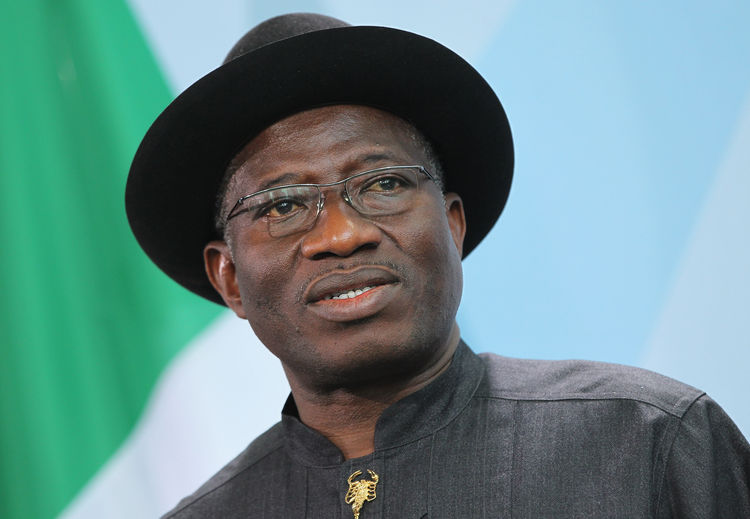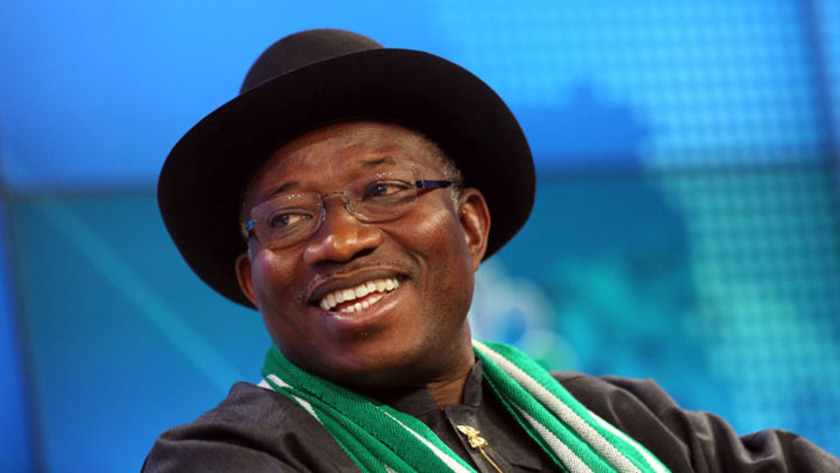Nigeria: Ex-leader seeks redo of anti-LGBT law he signed
Colin Stewart is a 45-year journalism veteran living in Southern…

Former Nigerian President Goodluck Jonathan has joined the club of former African leaders talking about the need to change their country’s anti-LGBT laws.
But he may be the only one who is discussing the importance of changing a harsh anti-gay law that he himself enacted.
Speaking at a Bloomberg financial information company forum in London on June 6, Jonathan claimed that he “had to” approve the Same-Sex Marriage (Prohibition) Act, because the National Assembly unanimously approved it and 98 percent of Nigerians oppose same-sex marriage. He had no choice but to sign the law, because he was “a democratic leader with deep respect for the rule of law,” Jonathan alleged.
But that law, which he signed in January 2014, went far beyond simply prohibiting same-sex marriage. It also provides for prison sentences of up to:
- 14 years for entering into a same-sex marriage.
- 10 years for attending a same-sex wedding.
- 10 years for a “public show of same-sex amorous relationship.”
- 10 years for belonging to any “gay organization,” whether it is seeking recognition of human rights for LGBT people, meeting the spiritual needs of LGBT people, or providing health care for LGBT people.

When Jonathan signed the new law in 2014, an existing Nigerian law already provided for a 14-year prison sentence for homosexual acts involving either men or women.
Now he says that “in the light of deepening debates for all Nigerians and other citizens of the world to be treated equally and without discrimination, and with the clear knowledge that the issue of sexual orientation is still evolving, the nation may, at the appropriate time, revisit the law.”
Jonathan’s new position is inadequate, says Mike Daemon, publisher of NoStrings podcasts, which provide a voice for Nigeria’s LGBTIQ community. He notes:
“This law has over the years since it was enacted, increased the heights of homophobia, promoted violence, discrimination, mob attacks, illegal arrest, extortion, and has even caused the death of many who identify as lesbian, gay, bisexual, and transgender in the country.”
He adds:
“We at NoStrings on behalf of the Nigerian LGBTIQ community demand an apology from the ex president for scapegoating homosexuals and for signing that law that took the lives of so many LGBTIQ Nigerians.”
In his remarks to Bloomberg, the ex-president expressed no explicit regrets, although he did admit that the law he “signed into law a bill that discriminates against a segment of our population.”
By discussing the importance of changing a harsh anti-gay law, Jonathan joins with Festus Mogae, former president of Botswana, and Kenneth Kaunda, former president of Zambia. Joyce Banda, former president of Malawi, also proposes repeal of her country’s anti-LGBT law; a moratorium on enforcement of that law was imposed while she was in office.
This is what Jonathan said about Nigeria’s 2014 law, excerpted from a full transcript of Jonathan’s speech:
Once we invest in our citizens, it will be our time to confidently enter the international stage. Each one of us will be able to go to any nation and proudly proclaim: “I am a citizen of Nigeria.”
When we have a good mindset, we must also strive for equality.
No investment in our people is going to pay off if we are unequal.
One area some of the international community disagreed with me, was that while I was in office, I signed into law a bill that discriminates against a segment of our population.
This private member bill was put forward in the context of polls that showed 98% of Nigerians did not think same-sex marriage should be accepted by our society. This was the highest percentage of any country surveyed.
The bill was passed by 100% of my country’s National Assembly. Therefore, as a democratic leader with deep respect for the Rule of Law, I had to put my seal of approval on it.
However, in the light of deepening debates for all Nigerians and other citizens of the world to be treated equally and without discrimination, and with the clear knowledge that the issue of sexual orientation is still evolving, the nation may, at the appropriate time, revisit the law.
When it comes to equality, we must all have the same rights as Nigerian citizens.
Former US Congressman Charles Rangel noticed the same thing when talking about America, he said “Full participation in government and society has been a basic right of the country symbolizing the full citizenship and equal protection of all.”
Equality will promote meritocracy, growth and security. Tribalism, regionalism and religious intolerance should never be acceptable in Nigeria.
Related articles:
- Ex Nigerian President, Goodluck Jonathan Regrets: Nigeria’s Anti-Gay Law May Be Revisited (June 6, 2016, NoStrings)
- Nigeria’s Jonathan Says Country May Revisit Law on Gay Marriage (June 6, Bloomberg)
- Setback in court challenge to Nigerian anti-gay law (October 2014, 76crimes.com)
- With Nigeria’s anti-gay law, HIV care drops 10%-70% (July 2014, 76crimes.com)
- AIDS could rebound as Nigeria gets harsh anti-gay law (January 2014, 76crimes.com)
- Archive of this blog’s articles about the Same-Sex Marriage (Prohibition) Act.




shout out to You coz its inhuman